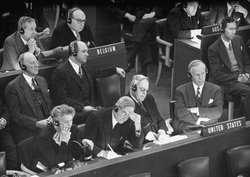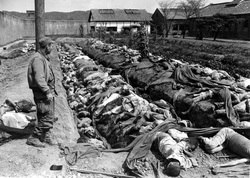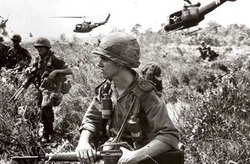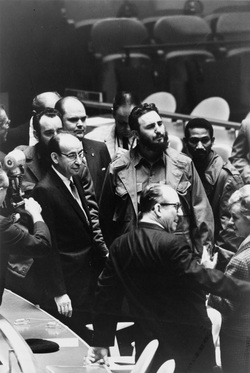First: What was going on during cold war?

Here’s a little context before treating this subject. The Cold War is known as the chain of events that raised intense rivalry and tension between the world superpowers and their respective allies, the United States and the USSR. The name “war” can be somewhat misleading though, since there was never an actual war between countries, but rather competition and shows of power to intimidate and threaten the opposite side. The US and the USSR were present and participating directly or indirectly in many foreign conflicts throughout the second half of the 20th century. Disputes such as these include but are not limited to the Korean War (1951-1953), the Vietnam War (1955-1975) and the Cuban Missile Crisis (1962). Other events such as the Space Race and the Berlin and Suez crisis are also included, but in this article we will focus on the former three.
The UN has had an important role in international relations since its foundation, and in times of conflict, meetings were still being held, used as an organized and respectful ground for debating and reaching solutions. Here are some of the important resolutions made to respond to these world-scale problems the UN was faced with.
The UN has had an important role in international relations since its foundation, and in times of conflict, meetings were still being held, used as an organized and respectful ground for debating and reaching solutions. Here are some of the important resolutions made to respond to these world-scale problems the UN was faced with.
Korean war

The Korean War is the belic conflict that came to be because of the different ideologies in North and South Korea. The North, supported by the USSR and China, followed a communist government, while the South followed capitalist ideologies. A war broke out on June of 1950.
The UN responded quickly in a session held in December 1951, already addressing the issue with the proposal of the “UN Korean Reconstruction Agency”, urging the countries to negotiate a diplomatic solution. On the 5th of February the next year, the UN proposed extraordinary sessions to treat the resolving of the “armistice in Korea” to be held throughout the year. These actions prompted officials to take the matters into discussion, hoping to reach a solution as soon as possible.
During December of 1952 a major advance was made. An agreement was reached to state terms of the release of war prisoners, respecting their rights and facilitating their return to the country. This was very important to the terms the war was being held in, since it eased tensions between both sides. The next year, the Armistice Agreement was signed by the two Koreas, successfully ending the war. The agreement restored the official borders between the two countries and ended the skirmishes. Further following of the situation took place in the UN forums of August 1953, inviting the presence of both sides in a future forum as well as requesting them to report their progress on the post-war resolutions.
The UN responded quickly in a session held in December 1951, already addressing the issue with the proposal of the “UN Korean Reconstruction Agency”, urging the countries to negotiate a diplomatic solution. On the 5th of February the next year, the UN proposed extraordinary sessions to treat the resolving of the “armistice in Korea” to be held throughout the year. These actions prompted officials to take the matters into discussion, hoping to reach a solution as soon as possible.
During December of 1952 a major advance was made. An agreement was reached to state terms of the release of war prisoners, respecting their rights and facilitating their return to the country. This was very important to the terms the war was being held in, since it eased tensions between both sides. The next year, the Armistice Agreement was signed by the two Koreas, successfully ending the war. The agreement restored the official borders between the two countries and ended the skirmishes. Further following of the situation took place in the UN forums of August 1953, inviting the presence of both sides in a future forum as well as requesting them to report their progress on the post-war resolutions.
Vietnam war

This was a very similar conflict between capitalism and communism as the one that happened in the Koreas. The North and the South Vietnam were trying to impose their ideologies on each other, as well as in the lands of Laos and Cambodia. The war started the 1st of November of 1955 and lasted for nearly 20 years until its resolution in April 1975.
The UN tried to prevent the conflict with several attempts to reach a peaceful resolution but the Soviet side tended to reject those resolutions, as they knew the capitalist South would be the most benefitted in a war they were better prepared for. On the 14th of December of 1955, 16 countries were added to the United Nations organization, among them were Laos and Cambodia. This movement was not a coincidence, but a strategy to give these territories involved in the war a voice and a vote in the UN forums.
In December 1971, the UN made very strong and firm resolutions regarding international security and the right of a country to decide by its own views. This clearly made an effect of the conflict in Vietnam, as in the following years, the United States president, Richard Nixon, retired the American troops from Vietnam. In the face of a losing battle and the wide opposition of the american people, president Nixon took back his declarations and admitted guilt of bad decisions he made, resigning his functions as president on August 1974.
The year the conflict officially ended, in November 1975 the UN reached agreements over the strict implementation of the “Declaration on the Strengthening of International Security”. These actions further demonstrated the commitment of the UN to preventing violent intervention in foreign countries. Many old policies were reaffirmed and restructured, as well as new ones were implemented and urged to be followed.
The UN tried to prevent the conflict with several attempts to reach a peaceful resolution but the Soviet side tended to reject those resolutions, as they knew the capitalist South would be the most benefitted in a war they were better prepared for. On the 14th of December of 1955, 16 countries were added to the United Nations organization, among them were Laos and Cambodia. This movement was not a coincidence, but a strategy to give these territories involved in the war a voice and a vote in the UN forums.
In December 1971, the UN made very strong and firm resolutions regarding international security and the right of a country to decide by its own views. This clearly made an effect of the conflict in Vietnam, as in the following years, the United States president, Richard Nixon, retired the American troops from Vietnam. In the face of a losing battle and the wide opposition of the american people, president Nixon took back his declarations and admitted guilt of bad decisions he made, resigning his functions as president on August 1974.
The year the conflict officially ended, in November 1975 the UN reached agreements over the strict implementation of the “Declaration on the Strengthening of International Security”. These actions further demonstrated the commitment of the UN to preventing violent intervention in foreign countries. Many old policies were reaffirmed and restructured, as well as new ones were implemented and urged to be followed.
Cuban Missile Crisis

The Cuban Missile Crisis was a series of negotiations between the US and the Soviet Union addressing the issue of the nuclear missiles placed in Cuba by the USSR. This event caused extreme tension between the two world superpowers, each dealing with a threat that could have resulted in nuclear warfare. Taking place in 1962, it was a time in which the US requested the removal of missiles from Cuba, as well as the USSR demanding the removal of american nuclear weapons from Turkey.
The year preceding the crisis, the UN reached a resolution expressing its concern about the testing of nuclear weapons. The resolution of November 1961 declares “earnestly urges the States concerned to refrain from further test explosions”. This proactive action stated the importance of proper control of the nuclear weapons.
After the conflict broke out in 1962 and was resolved shortly after, the UN approved a resolution on December of the same year. This resolution made a more drastic proposal, the complete abolishing of the use of nuclear weapons. This particular proposal was widely accepted in the forum, since it assured a situation as delicate and dangerous as what happened in Cuba would not repeat itself ever again.
The year preceding the crisis, the UN reached a resolution expressing its concern about the testing of nuclear weapons. The resolution of November 1961 declares “earnestly urges the States concerned to refrain from further test explosions”. This proactive action stated the importance of proper control of the nuclear weapons.
After the conflict broke out in 1962 and was resolved shortly after, the UN approved a resolution on December of the same year. This resolution made a more drastic proposal, the complete abolishing of the use of nuclear weapons. This particular proposal was widely accepted in the forum, since it assured a situation as delicate and dangerous as what happened in Cuba would not repeat itself ever again.
The Cold War ultimately proved to be a delicate issue that the United Nations had to deal with carefully and responsibly. However, preventive and active measures were taken into motion at the right times to contain violent revolts. It was a test for the unity and strenght of the UN.
 RSS Feed
RSS Feed